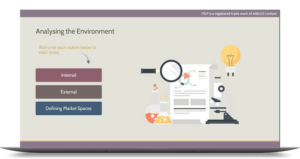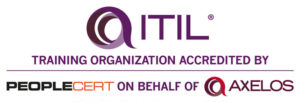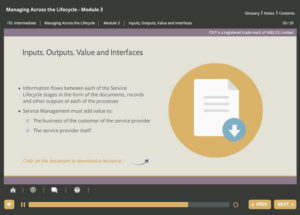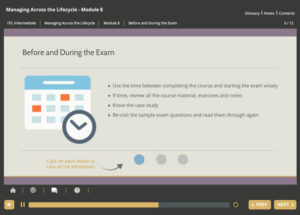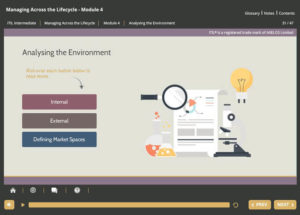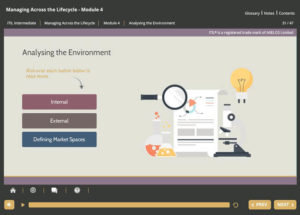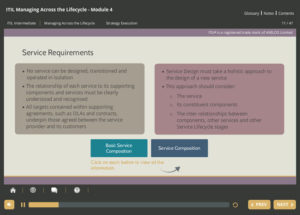E-learning ITIL® MANAGING ACROSS THE LIFECYCLE (MALC)
Study for a qualification in ITIL Managing Across the Lifecycle (MALC) by taking an online training course from 4PA!
Our course has been accredited by PeopleCert, who are licensed by AXELOS as an Examination Institute for an ITIL Managing Across the Lifecycle qualification in IT Service Management.
Why you Should Take This Course?
The ITIL Managing Across the Lifecycle Certificate has become the IT industry’s de-facto intermediate professional qualification in the field of IT Service Management.
The purpose of this ITIL Managing Across the Lifecycle (MALC) course is to give candidates the skills to support an organization’s service delivery by bridging the service lifecycle stages.
It also allows a successful candidate to demonstrate that they have learned the value of an integrated service management practice, as opposed to separate subject areas. It draws on knowledge gained at the Foundation and Intermediate levels.
Browse the course syllabus for a full module by module breakdown of what’s included.
With this course, you’ll receive 6 months access from the date of purchase as well as a FREE exam voucher to use whenever you are ready to sit the exam!
Managing Across the Lifecycle (MALC) focuses on providing candidates with the skills to support an organizations service delivery by bridging the service lifecycle stages.
The qualification demonstrates that candidates have learned the value of one combined service management practice as opposed to separate subject areas. ITIL processes and practices, as learnt from the lifecycle and capability streams of the intermediate certificates, are put into a context of delivering this value and this knowledge is validated in the associated exam and certification.
Our course has been fully accredited by PeopleCert, who are licensed by AXELOS as an Examination Institute for IT Service Management.
Why Study ITIL MALC with 4PA?
4PA is :
- A Leading Training & Consulting Organization
- Accredited by various principals
- World-wide presence and delivery models
- Unique, but proven,knowledge transfer and validation techniques
- Adds great value to the Organizations
- Result oriented approach
The Benefits of eLearning:
All 4PA courses run entirely over the web and have been carefully designed to provide the most comprehensive, interactive and flexible learning experience available. Study when it suits you – at home, at work or on the move.
Flexibility to learn from your desktop, laptop or tablet at your own pace, when it suits YOU. Anytime. Anywhere (an internet connection is required).
Our courses are easy-to-use. Participants will benefit from an interactive multimedia environment that enhances the way you study.
With eLearning, individuals and organizations avoid the typical costs of travel and consultancy by studying independently online.
Our online training courses are designed with mobility and accessibility in mind. You can access your training from any desktop computer, laptop, tablet, or mobile phone.
This eLearning course contains all the learning materials you need in order to prepare for the ITIL Managing Across the Lifecycle exam.
Our course has been accredited by PeopleCert, who are licensed by AXELOS as an Examination Institute for the ITIL® Managing Across the Lifecycle Certificate in IT Service Management.
The official mock exams are provided and the course includes a module on how to approach these, working through some examples.
In addition to the resources provided, the examination guidance recommends that candidates should complete at least 30 hours of personal study.
Full Details of our ITIL MALC Course:
Each of the syllabus areas will be covered in a module of the course; each module may contain a number of lessons, dependent on the areas covered.
Browse the contents of this eLearning course by clicking on a module title below that you would like to know more about. Why not try a free trial module of our course before you buy!
Module 1: Key concepts of the service lifecycle
This module represents a brief re-cap of key concepts in the ITIL service lifecycle, looked at from a strategic and managerial perspective, as an introduction and foundation for the rest of the syllabus.
The candidate must be able to understand and describe:
The five stages of the service lifecycle and how they interact with each other
Services from end-to-end: justification, design, measuring, testing, deploying, operating and looking for ways to improve
How service strategy elements dictate what constitutes value, and how value is defined and measured
Realizing business value in service operation
Testing and demonstrating the service value in service transition
Organizing for service management
Use of the RACI model to define and clarify roles and responsibilities, particularly in interfaces between processes and between service lifecycle stages
Risk assessment and risk management
Monitoring service measurements and using them to support all stages of the service lifecycleModule 2: Communication and Stakeholder Management
This module covers the value of good communication and ensuring its flow across the service lifecycle. It also addresses the effective co-ordination of interaction with both the business and suppliers as key stakeholders.
The candidate must be able to understand and describe:
Co-ordination of business relationship management across the service lifecycle and the role of business relationship management in communication
Stakeholder management and communication
Communication during continual service improvement
The use of service models to aid communication on service strategy and value creationModule 3: Integrating Service Management Processes Across the Service Lifecycle
This module looks at how Service Strategy influences other lifecycle stages, how Service Design should be carried out with the lifecycle in mind and the importance of ensuring that the Service Management process interfaces, inputs and outputs are integrated across the lifecycle.
The candidate must be able to understand and describe:
The integration of service management through the service lifecycle
The impact of service strategy on other service lifecycle stages
The value of a service lifecycle perspective when designing service solutions (
The inputs and outputs of processes and stages in the service lifecycleModule 4: Managing Services Across the Lifecycle
This module takes a high-level, holistic view of service management, from the perspective of managing services and service components through the service lifecycle.
It focuses on capturing customer and stakeholder needs, measuring service value to ensure that needs are met, and balancing potential conflicts and competing issues with regards to challenges, critical success factors and risks.
The candidate must be able to understand and describe:
Identification and assessment of customer and stakeholder needs and requirements across all service lifecycle stages, and ensuring appropriate priority is given to them
How the service design package (SDP) provides a link between service design, service transition and service operation
Flow of knowledge/experience/skills between lifecycle stages
Customer satisfaction surveys
Reviewing business trends and changed priorities, and keeping ahead of business projections Service level management (SLM) review meeting – reviewing management information and trends to ensure that services are meeting agreed service levels
The challenges, critical success factors and risks of the service lifecycle stages, and potential conflicts and competing issues across the service lifecycleModule 5: Governance, Roles, People, Competence and the Organization
This module covers governance and the organizational structure, the skills required and the service provider types.
The candidate must be able to understand and describe:
The importance and impact of good governance on service management
The use of governance in sourcing
The role of the IT strategy or steering group in setting direction, policy and strategy for IT services
The application of governance in change management, through change authorization to ensure the integrity of live services. The role of the change advisory board
The support from management systems to ensure appropriate governance
Assessing and applying various organizational structures for service management, and combining several perspectives in matrix organizations
The different service provider types, and the implication of choosing a specific typeModule 6: Measurement
This module focuses on the types of measurements that can be used to support the monitoring of service management activities and IT services throughout the service lifecycle.
The candidate must be able to understand and describe:
Measuring and demonstrating business value
Determining and using metrics
Service, process and technical metrics
Using measurements and metrics to validate, justify, direct, intervene
Designing measurement methods and metrics
Use of event management tools to increase visibility of the infrastructure and IT service delivery
CSFs and KPIsModule 7: Implementing and Improving Service Management Capability
This module covers implementing, assessing and improving Service Management.
It covers key considerations for the implementation and improvement of both the Service Management practice and the services themselves, as well as key considerations when planning and implementing Service Management technologies.
The candidate must be able to understand and describe:
Understanding the high-level goals and objectives of the organization. Identifying the external (legislation, competitors etc) and internal (organizational structure, culture etc) drivers
Service strategy implementation taking a service lifecycle approach
Using benchmarking to identify need for improvement for each service lifecycle stage
Planning for improvement with short-, medium- and longer- term improvement initiatives
Using the CSI approach and Deming Cycle to ensure that the organization continues to move forward with continual improvement
The seven-step improvement process, to measure progress and enable potential improvements to the service lifecycle to be identified Key considerations for implementation and improvement of both the practice of service management and the services themselves
Module 8: Exam Preparation
This module contains a description of the format and structure of the Managing Across the Lifecycle examination. It also offers advice and guidance about what to do before and during the exam.
Thinking of sitting the ITIL Managing Across the Lifecycle Exam? On this page, you will find everything you need to know!
In order to achieve this ITIL Intermediate qualification, you must pass the ITIL® Managing Across the Lifecycle Certificate in IT Service Management exam.
You can take the exam online (virtually) using a service provided by PeopleCert.
What you Need to Know About the Exam:
The exam is based on a case study and between 8 and 10 questions will be case study based. A maximum of 2 questions will not be based on the case study although each question will state clearly whether or not it is case study based.
To pass the exam you must get 35 out of 50 questions correct, or 70% and If successful, delegates will gain 5 credits towards ITIL Expert level.
The course materials provided in the Managing Across the Lifecycle eLearning course will provide you with all the information you need for this exam.
The examination is set at a higher level of difficulty than the Intermediate exams and will consist of ten complex multiple choice questions.
Exam Duration: Maximum 120 minutes for all candidates in their respective language (Candidates sitting the examination in a language other than their first language have a maximum of 150 minutes and are allowed to use a dictionary).
Before you book you can test that your computer configuration will meet the requirements for a PeopleCert exam, using this online test.
This test focuses on the suitability of your webcam, microphone and internet connection. Please Visit the PeopleCertwebsite for a complete list of information and guidance.
You will be Tested on:
Key concepts of the Service Lifecycle
Communication and Stakeholder Management
Integrating Service Management Processes Across the Service Lifecycle
Managing Services Across the Lifecycle
Governance, Roles, People, Competence and the Organization
Measurement
Implementing and Improving Service Management Capability
Exam Preparation
Why not try out a free trial module from our ITIL Managing Across the Lifecycle eLearning course!
In this ITIL Intermediate trial module, you will learn how to build service management capabilities in order that services flow through the Service Lifecycle. It includes interfaces between key processes and lifecycle stages.
Try the Course Before you Buy!
Like the full ITIL Managing Across the Lifecycle (MALC) eLearning course, you can access this free trial module from any device whether you are at home, at work, or on the move!
Our course has been fully accredited by PeopleCert, who are licensed by AXELOS as an Examination Institute for IT Service Management.
If you require any other information regarding the course or how to access the e-learning on a mobile device, please feel free to leave your details with us via our online contact form and a member of our team will be in touch.
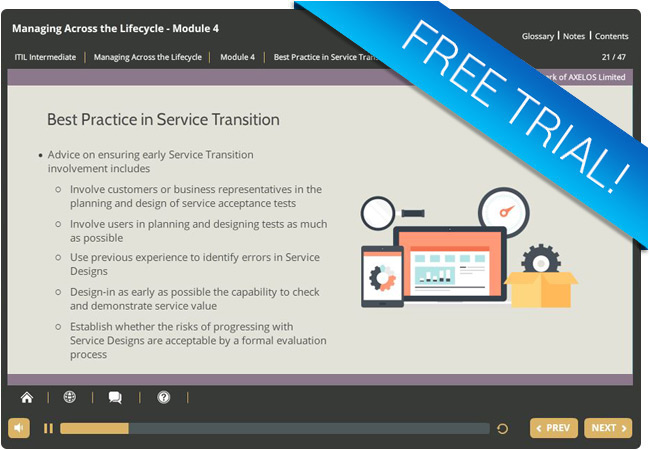
ITIL® and the The Swirl Logo™ are registered trade marks of AXELOS Ltd. Used and reporodued with the permission of AXELOS.


